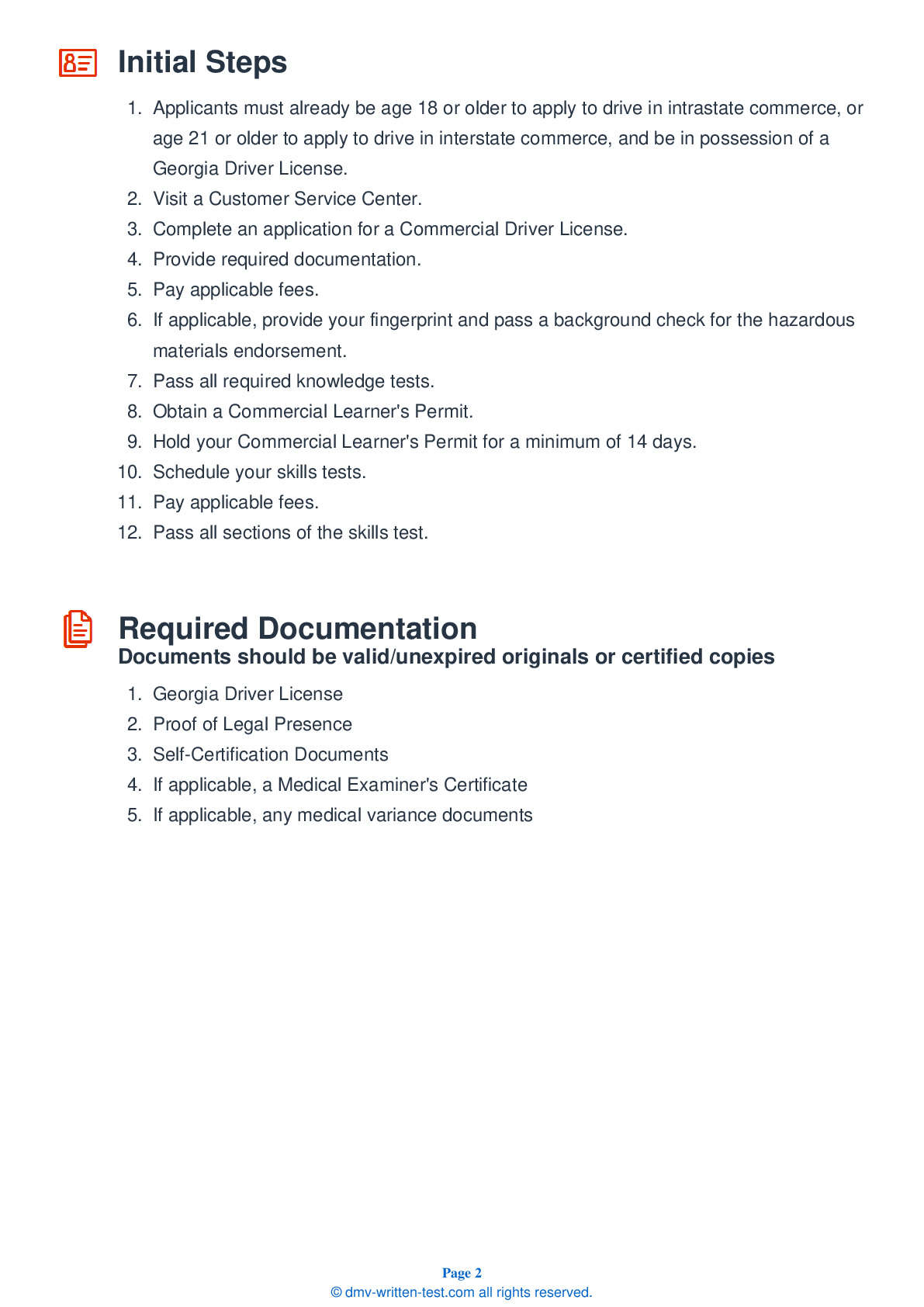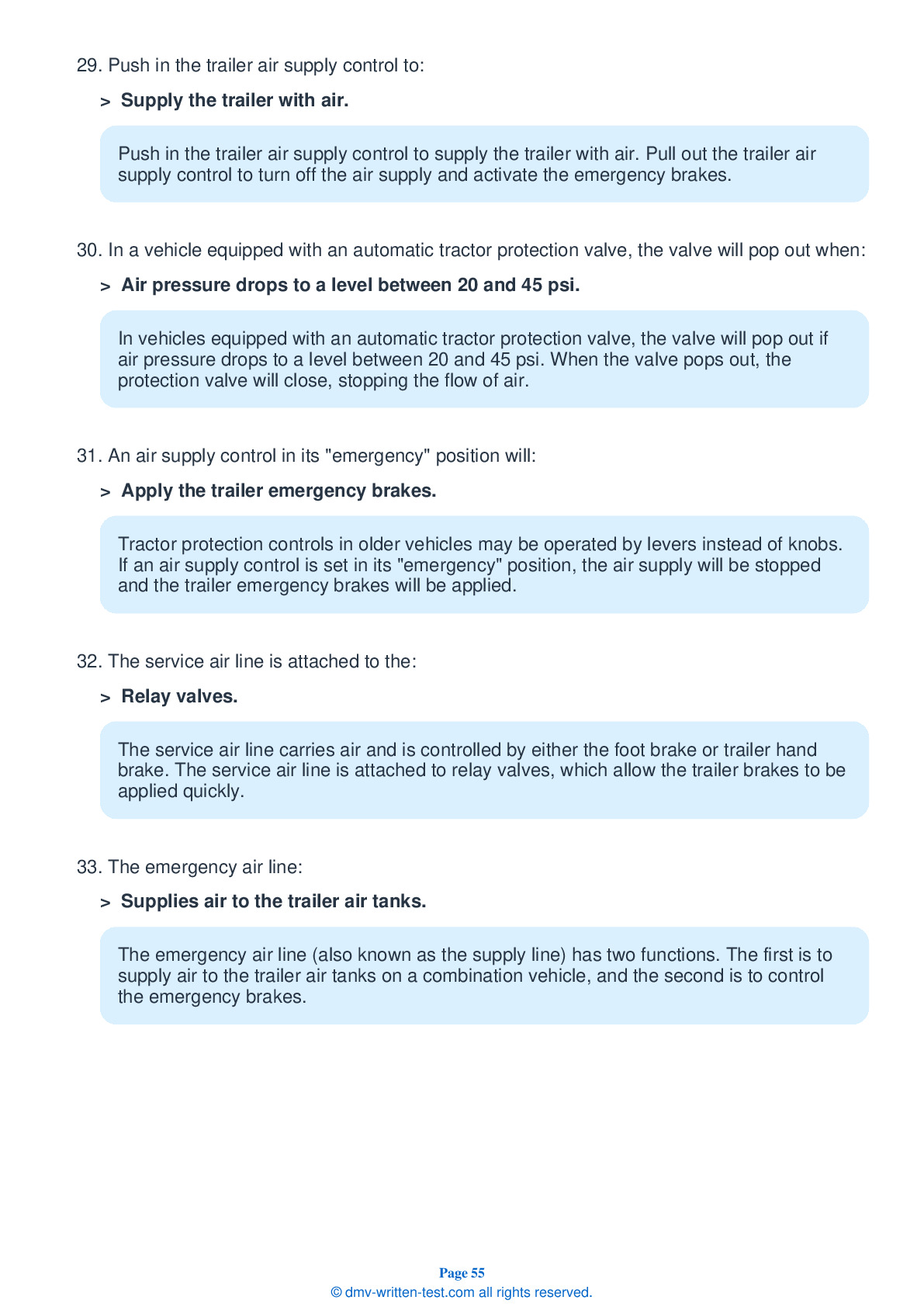Knowledge Test Class B
This license is required for driving a single vehicle with a GVWR of more than 26,001 pounds, and a trailer not to exceed 10,000 pounds gross vehicle weight rating, or a vehicle designed to transport 24 or more people (including the driver). To receive this license, applicants must pass a 50-question test. To pass, applicants must answer 40 questions correctly. Test questions come from the Georgia Commercial Driver’s Manual. Questions come from chapters covering: Introduction, Driving Safely, Transporting Cargo Safely, Air Brakes (if applicable), Pre-Trip Vehicle Inspection Test, Basic Vehicle Control Skills Test and On-Road Driving.. Endorsements that may be used with a Class B CDL are: Hazardous materials, Tank, Passenger, HazMat and Tank, Air Brakes and School bus.
15. Which of the following is not acceptable emergency equipment?
During the vehicle inspection test, you will need to show emergency equipment, including spare electrical fuses; three red reflective triangles, six fuses, or three liquid burning flares; and a properly charged and rated fire extinguisher.
16. A cargo cover that flaps in transit:
If cargo is covered, the cover should not flap in the wind in transit. The cover could tear loose, uncovering the cargo while potentially blocking your view or the view of others.
17. When starting a vehicle, the coolant temperature gauge should:
Keep an eye on the gauges after starting the engine. The coolant temperature gauge should begin a gradual rise to the normal operating range.
18. With your low beam headlights turned on, you should be able to see about ____ ahead of your vehicle.
Low beam headlights allow you to see about 250 feet ahead of your vehicle. When driving at night, adjust your speed so that you will be able to stop in the distance illuminated by your headlights.
19. When a tire goes flat, you may hear a loud bang. The truck will be affected:
There may be a delay of a few seconds between the sound of a tire failing and the time that the vehicle is affected by the tire failure. Because of the short delay, a driver may initially believe that the sound came from another vehicle.
20. If a person operates in both excepted and non-excepted intrastate commerce, which type of license should the driver select?
To operate in both excepted intrastate commerce and non-excepted intrastate commerce, you must choose a non-excepted intrastate commerce license.
21. When inspecting a power steering-equipped vehicle, you should be sure that:
When inspecting a vehicle equipped with power steering, check the hoses, pumps, and fluid level. Be sure to check for and repair leaks before operating the vehicle.
Frequently Asked Questions
To obtain a Class B CDL in Georgia, you must:
1. Meet the minimum age requirements: You must be at least 18 years old to obtain a Class B CDL license in Georgia; however, you must be at least 21 years old to operate commercial vehicles across state lines or transport hazardous materials.
2. Hold a valid Georgia driver's license: You must hold a valid Georgia driver's license to apply for a CDL.
3. Pass the vision test: You must pass a vision test with at least 20/40 visual acuity in both eyes.
4. Submit a medical certificate: You must submit a medical certificate from a licensed medical examiner to prove that you meet the physical requirements for operating commercial vehicles.
5. Pass the knowledge tests: You must pass the general knowledge test and any endorsements specific to the type of vehicle you will be operating.
6. Obtain a learner's permit: You must obtain a learner's permit and hold it for at least 14 days before taking the skills test.
7. Pass the skills test: You must pass the skills test, which includes a pre-trip inspection, basic vehicle control, and on-road driving.
Once you have passed all of these requirements, you will be issued your Class B CDL license in Georgia.
1. Straight trucks: These are trucks with a single cab and cargo area on the same chassis.
2. Large buses: These include school buses, city buses, and commercial buses.
3. Box trucks: These are trucks that have an enclosed cargo area separate from the cab.
4. Dump trucks: These are trucks used for hauling materials like sand, gravel, and dirt.
5. Delivery trucks: These include delivery vans and box trucks used for local deliveries.
6. Tow trucks: These are trucks used for towing disabled vehicles.
It's important to note that some Class B CDL endorsements may be required based on the specific type of vehicle you will be operating. For example, if you will be transporting hazardous materials, you will need to obtain the Hazardous Materials (H) endorsement in addition to your Class B CDL license.
1. Age requirement: You must be at least 18 years old to obtain a Class B CDL license in Georgia, however, you must be at least 21 years old to operate commercial vehicles across state lines or transport hazardous materials.
2. Hold a valid Georgia driver's license: You must hold a valid Georgia driver's license.
3. Meet the medical requirements: You must meet the medical requirements set by the Federal Motor Carrier Safety Administration (FMCSA) and submit a medical certificate from a licensed medical examiner.
4. Pass the written knowledge tests: You must pass the general knowledge test and any endorsements specific to the type of vehicle you will be operating.
5. Obtain a Commercial Learner's Permit (CLP): You must obtain a CLP and hold it for at least 14 days before taking the skills test.
6. Pass the skills test: You must pass the skills test, which includes a pre-trip inspection, basic vehicle control, and on-road driving.
7. Provide proof of social security number: You must provide proof of your Social Security Number (SSN).
It's also important to note that if you have any disqualifying offenses or medical conditions, it may affect your ability to obtain a CDL license in Georgia.
If you are planning to operate a Class B vehicle with air brakes, you will need to obtain an Air Brakes endorsement.
If you plan to transport passengers, such as in a bus or a shuttle, you will need to obtain a Passenger endorsement (P).
If you plan to transport hazardous materials, such as chemicals or flammable substances, you will need to obtain a Hazardous Materials endorsement (H).
If you plan to tow double or triple trailers, you will need to obtain a Doubles/Triples endorsement (T).
It's important to note that each endorsement requires passing an additional knowledge test. You can apply for endorsements at the same time as your initial CDL application or at a later time by adding them to your existing CDL license.
1. Vehicle Inspection: You will be tested on your ability to inspect your vehicle to identify any potential safety hazards. You will be asked to point out and explain any issues you find.
2. Basic Controls: You will be tested on your ability to control the vehicle in various situations, such as turning, backing up, and parking.
3. Road Test: You will be tested on your ability to safely operate the vehicle in typical traffic situations, including performing left and right turns, changing lanes, merging with traffic, and obeying traffic signals.
During the skills test, you will be evaluated by a licensed examiner who will score your performance based on a set of predetermined criteria. You must pass all three parts of the skills test to obtain a Class B CDL license.
It's important to note that you must also pass a written knowledge test before taking the skills test. The knowledge test covers topics such as safety regulations, vehicle operation, and traffic laws.
1. Vehicle Weight: With a Class B CDL license, you can operate vehicles with a gross vehicle weight rating (GVWR) of 26,001 pounds or more, but you cannot tow a trailer with a GVWR of more than 10,000 pounds.
2. Passenger Limitations: If you have a Class B CDL license with a Passenger endorsement (P), you can operate vehicles designed to transport 16 or more passengers, including the driver. However, if you transport hazardous materials, the passenger limit may be reduced.
3. Hazardous Materials: If you have a Class B CDL license with a Hazardous Materials endorsement (H), you can transport hazardous materials in amounts requiring placards.
4. Air Brakes: If you have a Class B CDL license with an Air Brakes endorsement, you can operate vehicles equipped with air brakes.
5. School Bus: If you have a Class B CDL license with a School Bus endorsement (S), you can operate school buses designed to transport 16 or more passengers.
It's important to note that there may be additional restrictions based on your specific situation or employer requirements. Always check with your employer and the Georgia Department of Driver Services for specific regulations and limitations.
To request a test in a language other than English, you must notify the DDS when you schedule your appointment. It's important to note that if you take the test in a language other than English, you will be required to take the skills test with an interpreter present.
Also, it's important to note that while the written test is available in multiple languages, the road skills test will only be given in English. This means you must be able to speak and understand English during the road skills test and while operating a commercial motor vehicle on public roads.
Some examples of accommodations include:
1. Providing a reader or scribe
2. Allowing additional time for the test
3. Providing a sign language interpreter
4. Offering an oral or audio version of the test
To request accommodations, you must inform the DDS when you schedule your appointment and provide documentation of your disability and the specific accommodations you need.
It's important to note that while accommodations can be made for the written test, the road skills test cannot be modified or adjusted due to safety concerns.
The fee for each written test attempt is $5 for a Class B CDL. If you fail the test three times, you will have to wait at least 7 days before retaking it again.
It's important to note that if you fail the test multiple times, it may be a good idea to study more before scheduling another appointment. There are many resources available to help prepare for the test, including study guides and practice tests. It's essential to review the Georgia Commercial Driver's License Manual thoroughly and understand all of the information presented before taking the test again.




